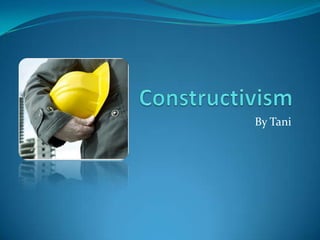
Constructivism
- 2. What is Constructivism? Based on a type of learning in which the learner forms, or constructs, much of what he comprehends Constructivists agree that students learn by doing Learning is an active, constructive process, and the learner is an information constructor New information is linked to prior knowledge
- 3. Key People Jean Piaget Jerome Bruner Lev Vygotsky John Dewey
- 4. Key People Jean Piaget Psychologist who observed children for many years Believed children think very differently from adults 4 cognitive stages: 1. sensorimotor when learning takes place primarily through the child’s senses and motor actions (egocentric) 2. preoperational children begin to use symbols and images (egocentric) 3. concrete operational children begin to think logically 4. formal operational children transition from concrete thinking to more abstract While children learn, they create schema cognitive understanding or development at any given time
- 5. Key People Jerome Bruner Proposed that learning is an active process in which the learner constructs new ideas or concepts based on his current knowledge Believed learners are actively engaged in the learning process Discovery learning inquiry-based; takes place in problem solving situations where the learner draws on his own past experience and existing knowledge to discover facts and relationships and new truths to be learned Explore and manipulate objects Wrestle with questions and controversies Perform experiments
- 6. Key People Lev Vygotsky Educational psychologist interested in children’s cognitive development Developed social cognition theory social interaction precedes development; consciousness and cognition are the end product of socialization and social behavior Zone of proximal development the distance between a student’s ability to perform a task under adult guidance and/or with peer collaboration and the student’s ability solving the problem independently Vygotsky encouraged collaborative learning
- 7. Key People John Dewey An educational psychologist, philosopher, and political activist The “Father of American Education” An advocate for child-centered instruction and educational reform Viewed school as a community and an extension of society Began the Laboratory School in 1896 (also known as the Dewey School) Progressive education educating the whole child – physically, mentally, and socially
- 8. Classroom Implications: Teacher.What does the teacher do under this theory? Constructivism is student-centered. So the teacher plays the role of facilitator, encouraging and engaging students. With technology Because constructivism is student-centered, teachers can create technology-based activities such as using Web Quests, scavenger hunts, curriculum pages, and computer game activities Without technology The teacher can create experiments, arts-and-crafts projects, and worksheets that allow students to be actively engaged. Technology isn’t a necessity in activities such as these.
- 9. Classroom Implications: Student.What does the student do under this theory? Students serve as “constructors” and active learners. With technology Students could engage in activities such as instructional computer games or perform a search on the Internet. Without technology Because technology is not a factor, students may be better off working together in collaborate groups to complete a task, such as a worksheet. This would keep them actively engaged. In reading lessons, students could create their own reading questions and try finding their own solutions
- 10. Constructivism:For my own teaching I believe that constructivism is a viable theory for my classroom. To integrate it into my teaching: I would create collaborate group-based activities Technology would be important in keeping my students engaged, interested, and involved Many lessons and activities would be hands-on learning experiences Worksheets would require critical-thinking and analysis skills Students would construct their own questions and try to find the answers on their own
- 11. Credits Textbook: Teachers Discovering Computers: Integrating Technology and Digital Media in the Classroom 5th ed. http://www.learning-theories.com/ First image: http://www.GraphicsHunt.com Second image: PowerPoint Clip Gallery Third image: http://www.piaget.org/aboutPiaget.html Fourth image: http://bruner.socialpsychology.org/countProfile.php?username=bruner Fifth image: http://faculty.weber.edu/pstewart/6030/6030.html Sixth image: http://www.cals.ncsu.edu/agexed/aee501/dewey.html